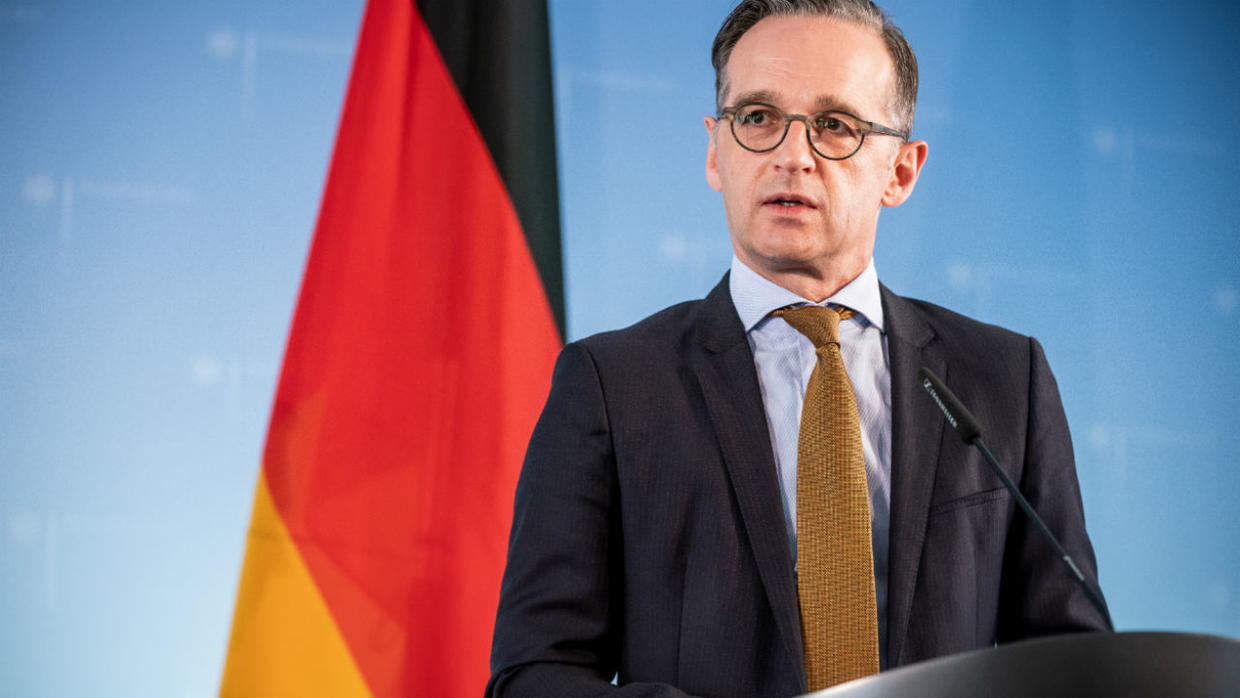Issued on: 07/06/2020 – 16:02Modified: 07/06/2020 – 16:03
German Foreign Minister Heiko Maas said in an interview Sunday that relations with Washington are "complicated" following media reports that the US wants to withdraw 9,500 troops from Germany, significantly reducing US commitments to European defence under NATO in what one former US military commander said would be a "gift" to Russia's Vladimir Putin.
Advertising
Read more
Germany on Sunday voiced concern at reports that President Donald Trump plans to cut the number of US troops stationed in Germany, amid fears it could weaken a key pillar of NATO defence in the region.
German Foreign Minister Heiko Maas said both countries stood to gain from close cooperation even if the transatlantic relationship had become "complicated" under Trump.
Other senior politicians in Berlin were more blunt, slamming the plan as the latest blow to US-German ties and a potential security risk.
"Should it come to the withdrawal of part of the US troops, we take note of this," Maas told the Bild am Sonntag daily.
"We appreciate the cooperation with the US armed forces that has grown over decades. It is in the interest of both of our countries."
Peter Beyer, Chancellor Angela Merkel's coordinator for transatlantic relations, warned that "the German-US relationship could be severely affected" by Trump's decision.
The Wall Street Journal and other media reported on Friday that Trump had ordered the Pentagon to slash the number of US military personnel by 9,500 from the current 34,500 permanently assigned in Germany.
Such a move would significantly reduce the US commitment to European defence under the NATO umbrella, and appeared to catch Berlin off guard.
'Wake-up call'
But Maas admitted ties with the Trump administration had become strained.
"We are close partners in the transatlantic alliance. But it's complicated," Maas told Bild, in a nod to rows ranging from the Iranian nuclear deal to NATO contributions and Berlin's support for a Russian gas pipeline.
There was no immediate confirmation from US officials about the alleged plan to slash US troop numbers in Germany and cap them at 25,000 in future.
But Trump's lukewarm support of longstanding cooperation agreements with European allies has long caused alarm on the continent.
The US leader been particularly scathing towards Germany in recent years, accusing the fellow NATO member of not spending enough on defence.
Germany hosts more US troops than any other country in Europe, a legacy of the Allied occupation after World War II.
Johann Wadephul, a senior member in Chancellor Angela Merkel's conservative CDU party, said the troop reduction plan showed that the Trump administration was "neglecting an elementary leadership task: involving alliance partners in the decision-making process".
It also served as another "wake-up call" for Europeans to take more responsibility for their own defence, he said in a statement on Saturday.
Only China and Russia stood to gain from "discord" between NATO allies, Wadephul added.
>> 'Russia is a strategic adversary,' says former NATO chief RasmussenRead More – Source
Issued on: 07/06/2020 – 16:02Modified: 07/06/2020 – 16:03
German Foreign Minister Heiko Maas said in an interview Sunday that relations with Washington are "complicated" following media reports that the US wants to withdraw 9,500 troops from Germany, significantly reducing US commitments to European defence under NATO in what one former US military commander said would be a "gift" to Russia's Vladimir Putin.
Advertising
Read more
Germany on Sunday voiced concern at reports that President Donald Trump plans to cut the number of US troops stationed in Germany, amid fears it could weaken a key pillar of NATO defence in the region.
German Foreign Minister Heiko Maas said both countries stood to gain from close cooperation even if the transatlantic relationship had become "complicated" under Trump.
Other senior politicians in Berlin were more blunt, slamming the plan as the latest blow to US-German ties and a potential security risk.
"Should it come to the withdrawal of part of the US troops, we take note of this," Maas told the Bild am Sonntag daily.
"We appreciate the cooperation with the US armed forces that has grown over decades. It is in the interest of both of our countries."
Peter Beyer, Chancellor Angela Merkel's coordinator for transatlantic relations, warned that "the German-US relationship could be severely affected" by Trump's decision.
The Wall Street Journal and other media reported on Friday that Trump had ordered the Pentagon to slash the number of US military personnel by 9,500 from the current 34,500 permanently assigned in Germany.
Such a move would significantly reduce the US commitment to European defence under the NATO umbrella, and appeared to catch Berlin off guard.
'Wake-up call'
But Maas admitted ties with the Trump administration had become strained.
"We are close partners in the transatlantic alliance. But it's complicated," Maas told Bild, in a nod to rows ranging from the Iranian nuclear deal to NATO contributions and Berlin's support for a Russian gas pipeline.
There was no immediate confirmation from US officials about the alleged plan to slash US troop numbers in Germany and cap them at 25,000 in future.
But Trump's lukewarm support of longstanding cooperation agreements with European allies has long caused alarm on the continent.
The US leader been particularly scathing towards Germany in recent years, accusing the fellow NATO member of not spending enough on defence.
Germany hosts more US troops than any other country in Europe, a legacy of the Allied occupation after World War II.
Johann Wadephul, a senior member in Chancellor Angela Merkel's conservative CDU party, said the troop reduction plan showed that the Trump administration was "neglecting an elementary leadership task: involving alliance partners in the decision-making process".
It also served as another "wake-up call" for Europeans to take more responsibility for their own defence, he said in a statement on Saturday.
Only China and Russia stood to gain from "discord" between NATO allies, Wadephul added.
>> 'Russia is a strategic adversary,' says former NATO chief RasmussenRead More – Source










